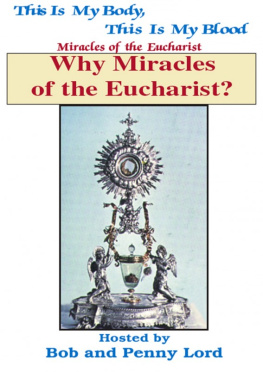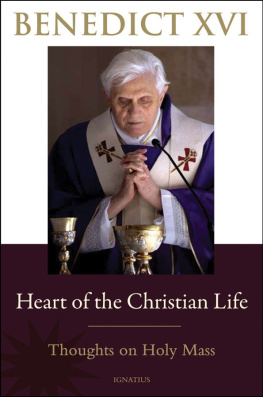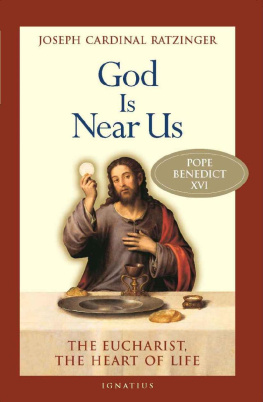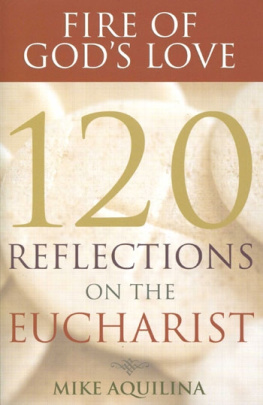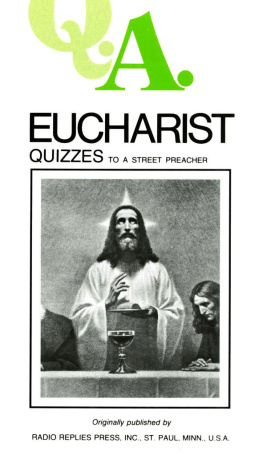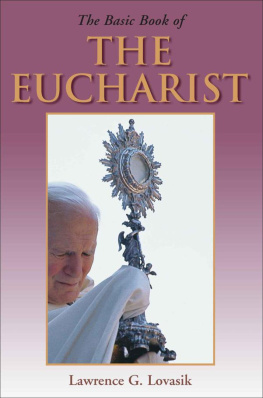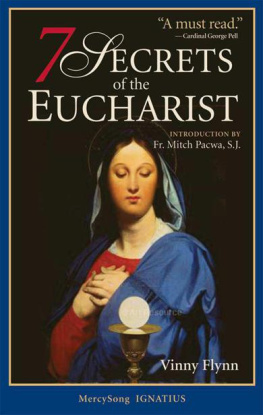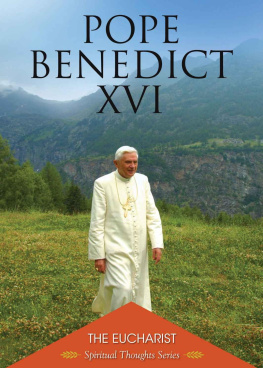WHY THE EUCHARIST MATTERS FOR YOUR LIFE
THE PRACTICAL REALITY of CHRISTS POWER & PRESENCE
Chris Padgetts words lift the mind and heart of the reader to where they were made to beon what is just, pure, lovely, and admirable (Philippians 4:8)and he does it with his unique gift for showing, in the most practical of ways, how heavenly realities make a difference in the here and now.
Chris Stefanick, speaker, author, and president of Real Life Catholic
In this honest, insightful, and entertaining book, Chris Padgett introduces us, once again, to a God who not only loves us but who likes us and who desires nothing more than for us to believe it. This isnt another treatise on the true presence of God in the Eucharist but rather an invitation to make sense of our lives, our families and our very selves through the gift of Jesus in the Eucharist.
Mark Hart, author, radio host, and executive vice president of Life Teen International
WHY THE EUCHARIST MATTERS FOR YOUR LIFE
THE PRACTICAL REALITY of CHRISTS POWER & PRESENCE
CHRIS PADGETT

Copyright 2014 by Chris Padgett
All rights reserved
Published by The Word Among Us Press
7115 Guilford Drive, Suite 100
Frederick, Maryland 21704
www.wau.org
18 17 16 15 14 1 2 3 4 5
ISBN: 978-1-59325-259-5
eISBN: 978-1-59325-460-5
Scripture texts used in this work are taken from the Catholic Edition of the Revised Standard Version Bible, copyright 1965, 1966, by the Division of Christian Education of the National Council of the Churches of Christ in the United States of America. Used with permission. All rights reserved.
Cover design by John Hamilton Design
No part of this publication may be reproduced, stored in a retrieval system, or transmitted in any form or by any meanselectronic, mechanical, photocopy, recording, or any otherexcept for brief quotations in printed reviews, without the prior permission of the author and publisher.
Made and printed in the United States of America
Library of Congress Control Number: 2014945335
CONTENTS
ACKNOWLEDGMENTS
Many thanks to the team at The Word Among Us Press. I am excited to be a part of the family. I would especially like to thank my wife, Linda, and our nine children. I am praying that they will grow in their love of Christ and one another. I suppose my greatest gifts to my children would be to love their mother entirely, faithfully, and joyfully, and to allow them to witness a broken man regularly healed by the loving presence of Jesus in the sacraments. Keep us in your prayers.
INTRODUCTION
T here are many things I could have put in this little book. Just the many quotes about the Eucharist by saints would fill numerous books! Here, however, I simply wanted to look at this simple question: how does the Eucharist affect the way I live my life? Will I be more forgiving because of the Eucharist? Will I find strength in the Eucharist to be more patient, gentle, and self-controlled? Will the reception of Jesus at Mass affect my stance on political and moral issues? Yes to all of the above!
The relationship that Jesus offers to us through his constant presence in the Eucharist enables us to see the world and ourselves differently. You will discover that I didnt spend time looking at the Old Testament types that are fulfilled in the New Testament, nor did I give you an examination of the Eucharistic passages in the Gospels and St. Pauls writings. I wanted you to find an immediate connection between receiving Jesus in the Eucharist and living a holy life in difficult times. As you read the reflections, I hope you are spurred to greater love for Christ and become more open to the many different ways that he wants to be present in your day-to-day life. I hope you are encouraged, and I hope you find many ways to be Eucharistic people!
There are a number of ways for you to approach this book. It is structured so that you can use it as part of an Ignatian-style retreat over the course of forty days, so it would be perfect for Lent. (I am not implying that you will suffer because of what you read here, although if you do, there may be some spiritual fruit!) You might want to use these reflections during Eucharistic adoration. Each reflection invites you to enter into the presence of Jesus. He is already faithfully present in our lives through the Eucharist, but this book may help you become more aware of it.
You can read the whole book through from start to finish or pick and choose as you wish. May you find this book thought-provoking and helpful, because I have truly been encouraged and challenged in writing it.
Chris Padgett
PART ONE:
EUCHARISTIC LOVE
BELOVED OF GOD
Gods unconditional love is expressed most tangibly in the Eucharist.
O ne morning at Mass, I was struck by the realization that our Father looks at each of us and says to us what he said to Jesus: This is my beloved child, with whom I am well pleased (cf. Matthew 17:5). We dont often think that God might be filled with joy at the sight of us. Our failures and frustrations seem to be glaring reasons for him to be distant and disappointed, and yet he is pleased. Why? Because we are his.
This is difficult for us to understand, but God wanted us, fought for us, and paid the ultimate price in order to be in a relationship with us! Even when we make mistakes, Gods love for us is unbending and unwavering. To be loved just as we are, sinful and imperfect, seems so countercultural becauseunfortunatelyour cultures comprehension of love is conditional. Gods love is not. He is pleased with us even when we are not pleased with ourselves. Our God loves us even when we struggle to love ourselves.
In his book Back to Virtue, Peter Kreeft describes agape as the love that kissed the traitor Judas, suffered the soldiers slaps and sneers, and prayed, Father, forgive them, for they know not what they do. The phrase the love that kissed the traitor Judas stood out to me. Think of a small childs resistance at being kissed when he isnt interested. He will squirm, wiggle, or do anything to avoid it. Jesus could have easily turned away from Judas, who approached and greeted him with a kiss. This was Judas moment of betrayal, but as a friend, Jesus genuinely accepted and received that kiss and, as Kreeft suggests, even returned it.
Simply put, Jesus loves us even when we betray him, even when we deny him, even when we run from him, and even when we dont recognize him. He expresses this most tangibly when we celebrate the Eucharist. How many times have we walked into church acting as if we love Jesus when our actions have proved otherwise? How often have we drifted off into a spiritual slumber after Jesus specifically asked us to watch and pray? Havent we fled when difficulties surfaced, just as the disciples did so long ago? Have we not in other moments pretended that we are not actually associated with Jesus, just so that we could avoid mockery or difficulties with others?
The Lord loves us when our attempts to love him fail. He loves us when we worry about what others will think if we make the Sign of the Cross in public, and he loves us when we carelessly indulge in selfish behavior rather than in selfless acts. Jesus, knowing all of our flaws, still willingly died for the sins we commit, not only against others, but even against himself.
We have a lot to learn about the intimacy to which Jesus invites us at every Mass. I can imagine that most of us, on more occasions than we would like to admit, have gone through the motions on a Sunday morning during the celebration of the Eucharist, thinking only of the many things that are going on in our lives. However, even in the times at Mass when we are more concerned with a football game or a work-related issue, Jesus still willingly and entirely comes to embrace us.
Next page

